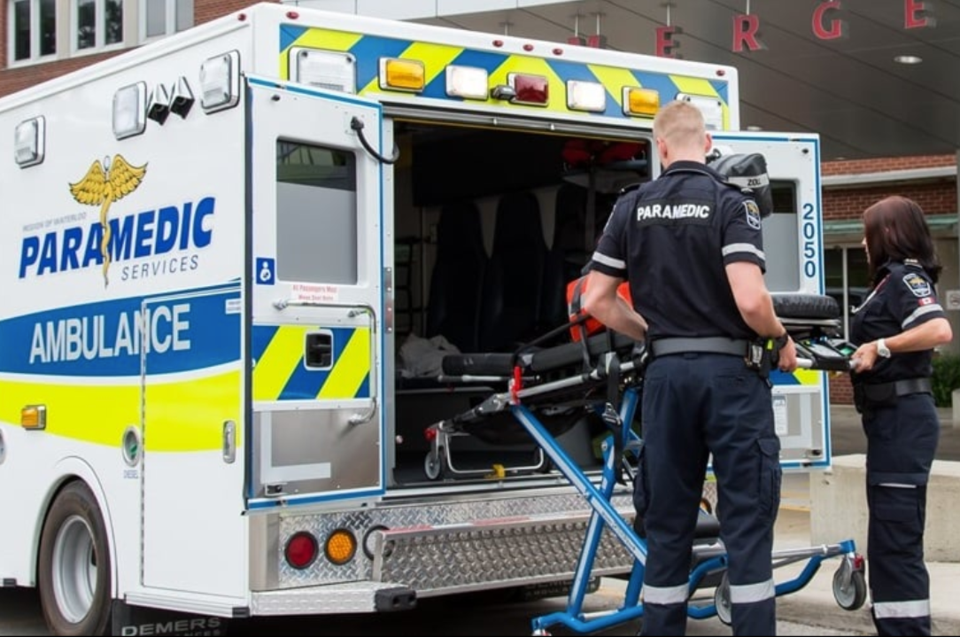The region is being asked to hire the equivalent of 29.3 full time paramedics to keep up with population growth and call volume increases, and to reduce stress on an overburdened workforce.
The pre-2024 budget request for $4.4 million in additional funding is the same request made last September, which was deferred by the previous council.
The money is being sought now in order to onboard staff on or about January 1, 2024 to relieve system pressures and deliver the desired level of service.
Chief of paramedic services John Riches appeared before the region's community and health services committee Tuesday to make the request, highlighting per-hour ambulance utilization numbers which at 43 per cent are far higher than the approved target of 35 per cent, and which at this rate are unsustainable.
The request comes as offload delays continue to burden the service with the equivalent of three 12-hour ambulance shifts being lost per day to offload delay, Riches told council.
But it also comes as the region received $1.6 million from the province to hire more nurses dedicated to offloading patients, the pending implementation of a Fit2Sit policy designed to relieve those pressures, and call diversion measures that are already doing the job of reducing the code reds and yellows that come when no or few ambulances are available to respond.
"The key thing here to message you about is continued investments are required in order to keep up with those responses," Riches said. "If we can tackle the issues of code reds and code yellows...by default that means we have a healthy sustainable response system for the community."
Improvements reported this week are due to council supported enhancements, he added.
"But what's important to us is that although we're seeing less frequent events of code reds and code yellows, the amount of time we're spending per event is increasing."
"Once we get into code reds and code yellows, we're really in the weeds and it's really struggling so it makes it harder to get out of code reds and code yellows," he added.
They're caused by natural spikes in 911 call volumes due to weather changes or other types of events combined with patient volumes at local hospitals which results in offload delays.
Population growth coupled with a huge spike in 911 calls, greater than what the services' master plan considered, are driving the budget request, Riches said.
Loss of staff due to wellness concerns and vacations is adding to the problem.
Part of the funding, about $375,000 annually, will support the development of a comprehensive mental health strategy for paramedic staff, the result being fewer staff absences due to mental health concerns, Riches said.
Paramedics deal daily with traumatic events including crimes, accidents, disasters, deaths, child health crises and witnessing serious injuries.
Those stressors put paramedics at an increased risk of mental health disorders, including post-traumatic stress disorder (PTSD), depression, anxiety, and burnout, Riches said.
A study of public safety personnel found 44.5 per cent reported clinically significant symptoms, and 23.2 per cent showed symptoms of PTSD.
PTSD injuries are the most costly Workplace Safety Insurance Board claims.
Of all short term disability claims made between Jun. 1, 2022 – May 31, 2023, 31 per cent were related to mental health while 50 per cent of of long-term disability claims were related to mental health.
Riches said in a case where they lose a paramedic for six months due to a mental health absence, the region is not only incurring the loss of earnings for that paramedic and a 20 per cent cost on the WSIB administration fees, but also the cost of back filling the position.
Depending upon the salary of the employee, a six month absence equates to a cost of between $103,000 and $126,000 for the region.
If the strategy prevents five staff members from having to take a six month leave, the strategy pays for itself, Riches said, adding that his staff deserves to be supported and prioritized when it comes to their wellbeing.
Paramedic Services consulted with the Breakwater Institute, a Cambridge mental health agency that specializes in first responder mental health and trauma, to onboard a peer support mental health team.
Regional councillor Doug Craig questioned the slower response times in Cambridge for ambulance calls, which he says has been historic.
Riches said they are looking at adding resources to Cambridge to address an increase in 911 calls, which he added could be caused by a number of factors including the aging population and access to healthcare.
The budget request passed the committee level unanimously.



